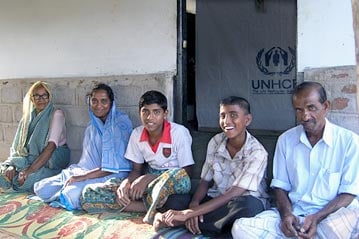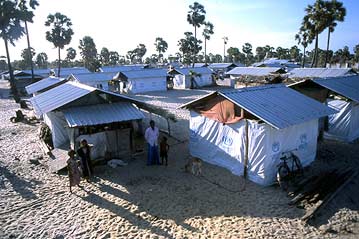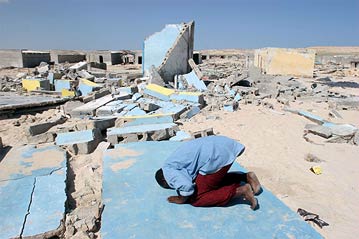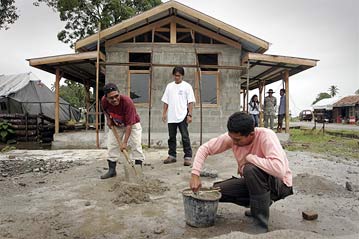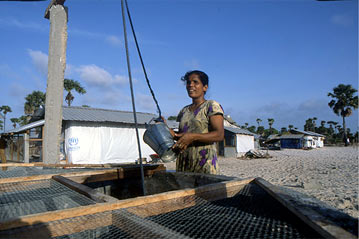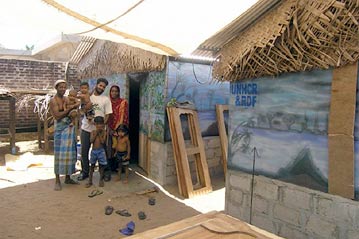Tsunami emergency: Indonesia, Somalia and Sri Lanka latest
Tsunami emergency: Indonesia, Somalia and Sri Lanka latest
As we announced yesterday, UNHCR's portion of the joint UN flash appeal for the tsunami emergency is $75 million for operations in Indonesia's Aceh province, in Sri Lanka and in Somalia. UNHCR will focus on shelter, non-food aid and logistical support. As the High Commissioner mentioned yesterday, an enormous amount of international solidarity and support has been offered in meeting the needs of millions of disaster victims. Now we need donors to quickly step forward with the actual funding so we can keep the momentum going. Meanwhile, UNHCR is continuing its activities using our existing resources and a $5 million "loan" from our emergency reserves - money that has to be repaid.
Here is a brief overview of latest developments in the three countries UNHCR is focusing on.
Sri Lanka: UNHCR is airlifting extra relief supplies into Sri Lanka over the weekend to replenish all of the stocks there that we distributed in a round-the-clock operation that began on the day the tsunami struck. Before the tsunami, UNHCR was caring for 390,000 conflict-displaced and returning refugees in Sri Lanka, so we already had pretty sizeable stockpiles on the ground. Now, with an additional half a million displaced by the tsunami, those stockpiles are pretty much depleted and we're scrambling to get more in and to strengthen our existing distribution network. On Saturday evening (8 January), a charter flight from Frankfurt carrying five portable warehouses and 10,000 plastic sheets from our central warehouse in Copenhagen is scheduled to land in Colombo. The five portable warehouses have a capacity of up to 1,000 cubic metres each, and will be used to expand warehousing capacity for relief supplies in Colombo and in other parts of the country. Also, a further 20,000 cooking sets are expected to be brought in next week from New Delhi. Hours after the tsunami struck on 26 December, UNHCR started distributing relief supplies for 20,000 families (100,000 people), including plastic sheeting, cooking sets, rope and clothing from one of the few existing stockpiles of relief supplies in Sri Lanka.
Indonesia: Today, in Aceh province in Indonesia, Assistant High Commissioner Kamel Morjane, who oversees UNHCR's global field operations, visited the destruction zone in Banda Aceh and was horrified by what he saw. He said every destroyed house is testimony to a shattered life, and our task now is to help them rebuild. He met with seven members of UNHCR's international emergency team to discuss the immediate tasks ahead in the coming days and weeks. The team is scheduled to reach 16 international staff over the weekend.
The emergency team has visited hospitals and the spontaneous settlements that have sprung up around the town to start assessing shelter and health conditions. The team's senior site planner is exploring a temporary but practical family shelter design as a first step in formulating a shelter policy in coordination with the government and other agencies. A UNHCR community services officer is also visiting displaced people in many of the spontaneous tented settlements.
On Thursday, the UNHCR team leader formed part of an assessment mission by helicopter to the island of Simeulue off the western coast of Aceh. The mission - which included the deputy governor and the health minister of Aceh province - was told by local authorities that a relatively small number of islanders had been killed or injured in the disaster despite Simeulue's proximity to the epicentre of the earthquake. The low casualty toll was attributed to a local tradition that when a strong earthquake hits, islanders flee inland to higher ground. Several thousand people are displaced out of the total population of 79,000, but UNHCR's team leader said they are being well taken care of by the local authorities, who are providing temporary shelter. People are now starting to repair their homes but need material support.
UNHCR currently has nine international staff and four local staff in Banda Aceh with a further seven internationals and three local staff expected to reach the city over the weekend. The entire 16-person emergency team is scheduled to be fully deployed early next week.
Somalia: UNHCR is also assisting disaster victims in north-east Somalia with relief supplies and shelter materials for 5,000 households. We're working closely with WFP and are currently loading 32,500 blankets and 2,995 plastic sheets from our Kenya stocks onto a WFP ship in Mombasa which is expected to depart over the weekend for the Somali port of Bossasso. WFP is also assisting us with onward transportation to the affected areas as well as using their distribution network to get the relief supplies to the affected population. Further deliveries of aid, including blankets, kitchen sets, mattresses and jerry cans are planned.
While the world's attention has understandably been riveted on the Indian Ocean disaster, UNHCR is also reminding donors of the enormous needs still faced by millions of refugees and others of concern around the world. In a meeting yesterday afternoon with government donors here at the Palais, the head of our Asia/Pacific bureau, Janet Lim, urged them to ensure that their generosity to victims of this disaster will not be at the expense of the 17 million refugees and others of concern to UNHCR elsewhere in the world. Among them are hundreds of thousands of Sudanese, some of whom now see some hope on the horizon.

